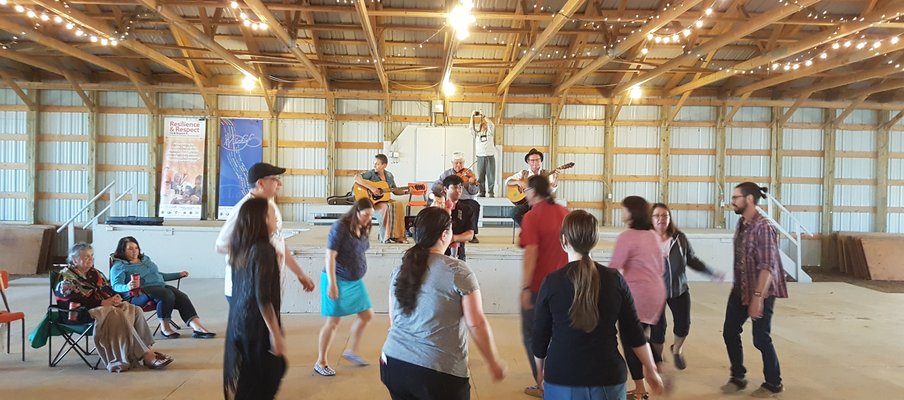Listening to Community Leads to Meaningful Support

Related Programs
This past year, SK Arts, in partnership with SaskCulture, held 10 virtual community consultations (talking circles) with First Nations Elders, Residential School Survivors, artists and Knowledge Keepers, to discuss how arts and culture funding programs could be created to meaningfully support Truth and Reconciliation initiatives in the province. Consultations, which took place Oct. 2021 to Jan. 2022, provided an opportunity to explore the idea of “participatory grantmaking”, which brings community-level insight into funding program design.
Carol Greyeyes, program consultant, SK Arts, was tasked with developing the framework for a Truth and Reconciliation projects grant program for SK Arts. She invited Damon Badger Heit, supervisor, partnerships and inclusion, SaskCulture, to help identify options for this framework. SaskCulture, in its funding renewal process, is also interested in hearing from community and exploring new ways to deliver funding, particularly those that support Indigenous leadership of programs.
“As we were doing some revisions to our Artist in Schools/Artist in Community programs, which SaskCulture and SK Arts partner on, I recognized that there were limited opportunities for an exclusively Indigenous-led project. There was always opportunity for Indigenous Elders and Knowledge Keepers to be a part of a project, but they were usually peripheral, they were not the lead artists, and it was not an Indigenous organization that would typically apply. This new framework was an opportunity to change that," said Greyeyes.
The consultations with Indigenous Residential School Survivors, artists and Elders were the result of early discussions. According to Greyeyes, “We recognized the two of us couldn’t just sit in our rooms at our computers and develop a Truth and Reconciliation program. This had to come from the community,” she says. “Instead of launching something right away, we really took our time and did these consultations, which happened on Zoom because of COVID.” Holding consultations online increased the ability to get people from around the province to participate, without the challenges of travel.
At the beginning of the consultations both Greyeyes and Badger Heit asked community members for their thoughts on Call #83 from the Truth and Reconciliation (TRC) Calls to Action, which calls upon arts organizations to establish, as a funding priority, a specific program for Indigenous and non-Indigenous artists to undertake collaborative projects and produce works that contribute to the reconciliation process.
Badger Heit notes that, “We wondered whether or not this call resonated with our people. Whether there was an appetite in our communities to be engaged in this type of work. The majority told us the opposite.”
Participants in these discussions expressed that there is not a lot of appetite for Indigenous groups to do the cross-cultural heavy lifting or to handle educating non-Indigenous people on Indigenous culture. “In many of these projects, the leaders are sharing painful histories, which contain traumatic experiences. They said that energy needs to be directed to help their own communities right now. Many leaders said, 'we need to help rebuild ourselves, support ourselves and develop ourselves.' That was a clear common thread throughout most of the consultations,” explains Badger Heit.
Participants overwhelmingly supported the idea of “nothing about us, without us” adage. “It is very important that it is Indigenous leaders who are making decisions on matters about Indigenous peoples,” shares Badger Heit. “Elders, artists and Knowledge Keepers are the experts on what is needed, and they have been doing this a long time. Through this process, there are residual effects that will inform us in how to carry this work forward with other groups that have been excluded, that have no leadership, no voice or agency in these systems.”
The consultation process provided lots of good insight and a useful model for engaging Indigenous peoples in the development process going forward. “For me this process is one that we can learn from collectively as funding and cultural organizations,” says Badger Heit. “This is one small example that shows corporate entities how to engage in TRC by taking a different approach. This small effort is ultimately just a start, a small spark of a program, but one that ultimately can penetrate into our organizations as a whole. Maybe, it will become a transformative wildfire.”
SK Arts is currently in the process of compiling its findings from the consultations and developing a new program structure that is Indigenous-informed and led. Although this new program is not yet named, applications are set to begin in the fall of 2022.

